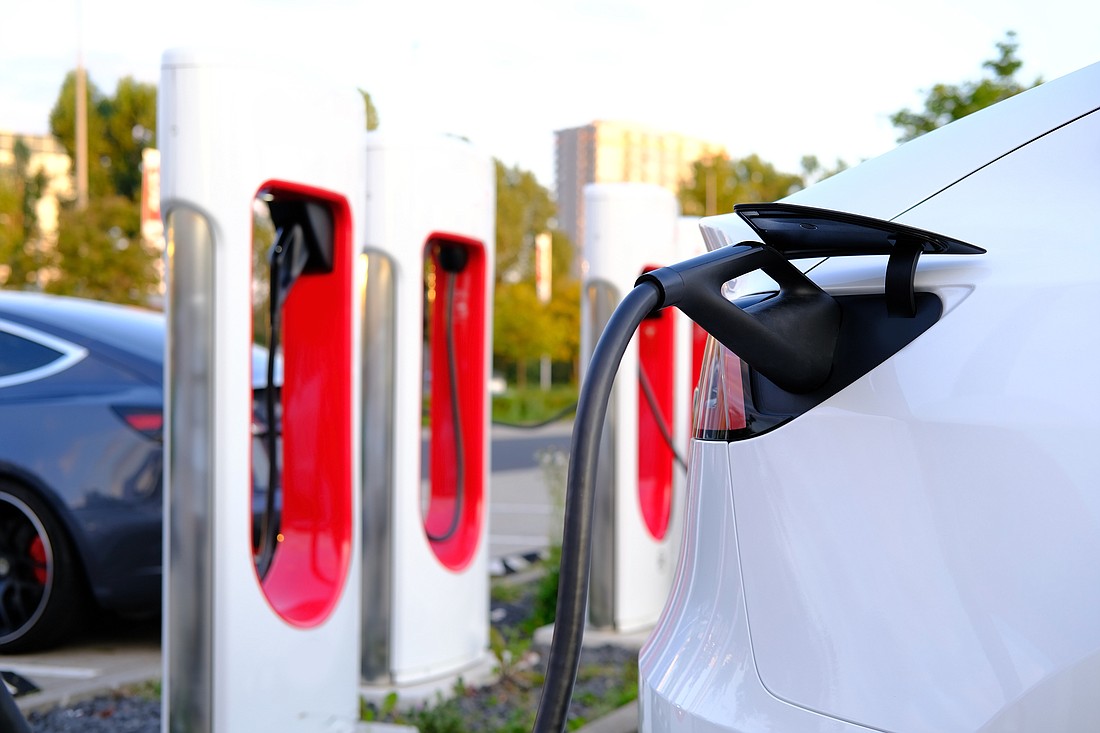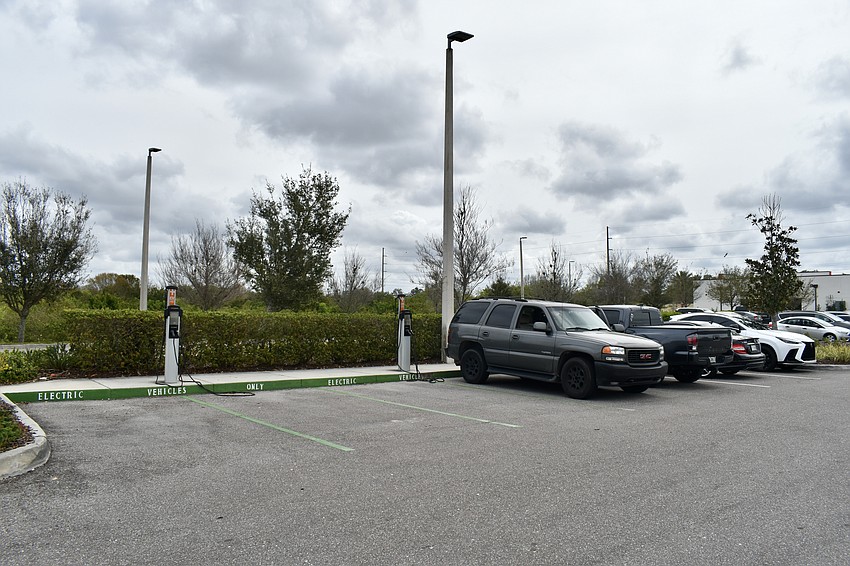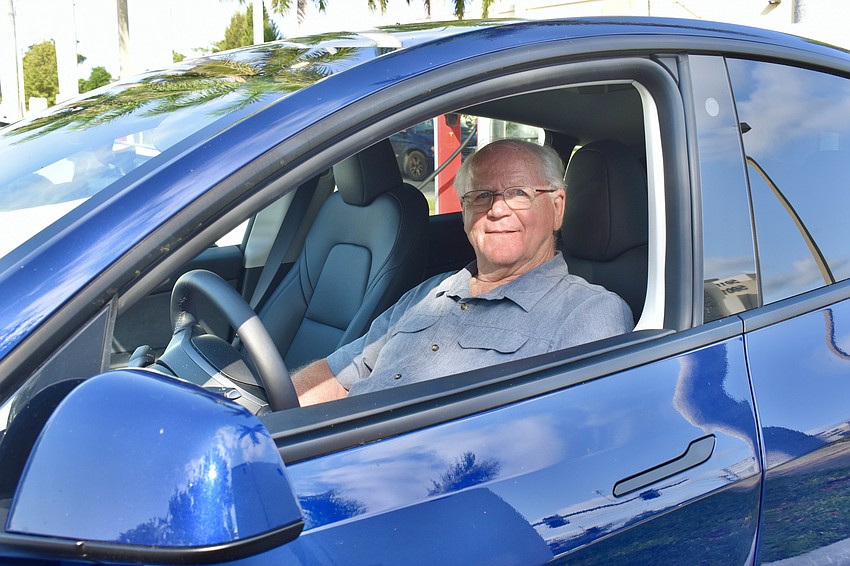- May 1, 2025
-
-
Loading

Loading

It was a Friday at noon, and the parking lot at The Green on State Road 70 was packed except for three open spots in front of LA Fitness.
Those weren’t handicap spots, as most of those were taken, too. These spots were reserved for electric vehicle charging. There are actually four spots reserved for electric vehicles in front of the gym, but one was being used by a gas powered GMC Yukon.
“I gave up my spot right over there,” Bradenton resident Paul Finn said. “I’m parked here because I’m waiting for my wife to come out (of LA Fitness).”
By Florida statute, parking a gas powered vehicle in a space reserved for an electric vehicle is prohibited. However, policing such violations remains an issue.
“We haven’t received complaints related to electric vehicle charging,” said Randy Warren, the public information officer for the Manatee County Sheriff's Office. “Deputies will issue a citation if it’s posted — ‘No parking except for charging.’”
The federal government is pushing for 50% of all new vehicle sales to be electric by 2030. The number of registered electric vehicles in Florida nearly tripled from 2021 to 2023 (Kelley blue book estimates 1.2 million EVs were sold in the U.S. in 2023), and the population in Manatee County continues to grow.
Should the county be preparing for the day when drivers are fighting to find parking spaces that offer EV chargers?
Manatee County staff members wanted to amend the Land Development Code to require developers to provide a certain number of EV charging parking spaces in any new lots.

Commissioner George Kruse said he would never approve such a measure because it’s a free market and there are no mandates for gas stations or car washes.
“It’s one thing when you have handicap (parking), there are (Americans with Disabilities Act) requirements,” Kruse said. “But to mandate developers to spend their money to build specific parking solely for people who voluntarily choose to buy a certain kind of car, that’s way beyond my view of the reach of government involvement in development.”
When Manatee County staff members presented the LDC amendment to the Planning Commission on Jan. 26, the move was voted down because most members held the same view as Kruse — the requirement is an example of government overreach.
Only Manatee County Planning Commission member Cindy Kebba sided with staff members on the issue. She didn’t see a huge jump from current regulations that say developers have to provide a sufficient number of non-EV parking spaces to mandating that 2% of the already stated requirement be EV capable.
Under the proposed amendment, developers would only be required to provide a conduit to charge, not the actual charging unit. In a parking lot with 50 spaces or more, 2% of the spaces would have to be EV capable.
Staff presented the idea to the board based on 2030 market projections that say 30% of vehicles will be powered by electric. They were also following suit with other municipalities. Orlando, the City of Miami Beach and Coral Gables have passed ordinances that require a 2% parking ration for EV charging.
While Planning Commissioners were briefed on the amendment, the matter never made it to a vote. County Attorney Sarah Schenk warned the Planning Commission members that they were dealing with a “moving target.”
“There are a number of proposed bills for the Florida Legislature that expressly preempt the regulation of EV charging stations to the state,” she said.
Schenk referred to Senate Bill 1084. It passed on March 6 and will take effect on July 1. The bill prohibits local governments from regulating electric vehicle charging stations.
The Florida Building Code requires a minimum of two “EV ready” spaces for every new parking lot with 25 spaces or more.
Despite local EV spaces from the Green to Waterside often being empty, Tesla imposed a congestion fee on its customers across the country in November 2023. The move was to stop those using a charger from blocking it for long periods of time after they are finished.
If a driver’s car is at a 90% charge or more, they’re billed $1 per minute to charge when the Supercharger station is busy. The company had already been charging an idle fee of between $0.50 to $1 that goes into effect five minutes after charging is complete.
“We envision a future where vehicles move themselves once fully charged,” the Tesla website reads. “Until then, we ask that vehicles be moved from the Supercharger once charged. A customer would never leave a vehicle parked by the pump at a gas station, and the same thinking applies with Superchargers.”
Whether there's a need for more EV parking or not, outside of two spaces, it's up to developers to decide if they want to accommodate and attract EV drivers. And whoever installs the charger decides who pays the electric bill.
At Ellenton Premium Outlets, the Mall at University Town Center and Waterside Place, drivers are charged about $0.40 per kilowatt hour. At Whole Foods and LA Fitness, charging is a complementary service.
“Every center we do now, we’re contemplating EV parking stations,” said Michael Chadwick, the managing director of Southeast Development for Casto Development. “I think we're putting in four at Center Point.”
The Whole Foods on University Parkway has free charging out front, and there's a Tesla station with 20 Superchargers behind the store. On Sunday morning, the Tesla lot was about a quarter full.
“I’ve seen it about 80% full,” Sarasota snowbird Bob Polkowski said.
Polkowski and other drivers in the lot weren’t happy that Tesla is opening up its Supercharger stations to non-Tesla drivers. They fear long lines and slower charging.

As of Feb. 29, some Ford drivers can use Tesla stations with an adapter. Several other car manufacturers have committed to offering adapters by the end of this year or in 2025.
None of the Teslas in the lot were parked next to each other. Two cars sharing a charger have to split the kilowatts, which slows the process. It takes about an hour to get a full charge at a Superstation, which is faster than most charging stations.
Polkowski thought the Manatee County staff members’ idea was a good one. He’s on his second Tesla, and he will continue buying EVs over gas powered vehicles.
“It’s cost me $9.41 for approximately 120 miles so far,” he said.
Polkowski’s home state is Michigan. He’s not only driven to Florida in his Tesla, he’s driven it to Connecticut and cross country twice with no charging issues.
That might be because, according to a 2023 Bloomberg report, Tesla has the largest network of chargers in the country. Polkowski also said he’s never had trouble hooking up to a Supercharger.
An app like PlugShare offers a contrasting view of non-Tesla stations. The app offers a place for EV drivers to find nearby charging stations and provide updates on each individual charger within a station.
Every charging station mentioned has received at least one complaint that the station couldn't be activated, even the Tesla station.
“If there’s not sufficient charging stations, maybe people shouldn’t be buying electric cars until the infrastructure is in place,” Kruse said.